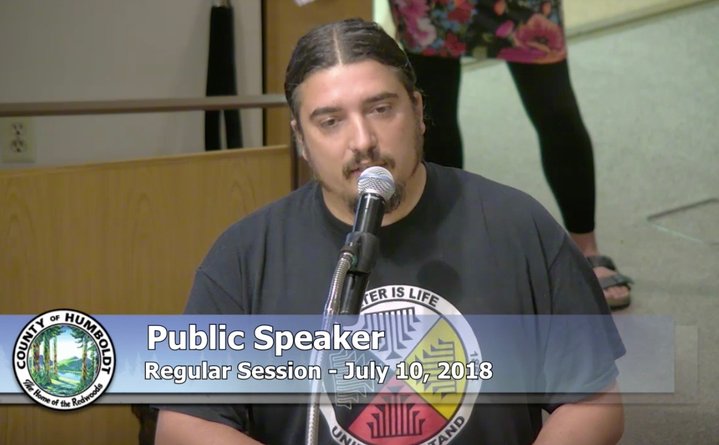
Erik Rydberg addresses the Humboldt County Board of Supervisors. | Screenshot of county video feed.
At Tuesday’s meeting of the Humboldt County Board of Supervisors, members of the public voiced strong support for a countywide immigrant sanctuary ordinance, albeit with some minor concerns about the burdens it might place on county commissions and employees.
And after flirting with the idea of passing the ordinance outright, the supervisors instead voted unanimously (with Fifth District Supervisor Ryan Sundberg absent) to send the Humboldt County Sanctuary Law Initiative on to the November general election ballot.
While anti-immigrant sentiments abound in some public spheres — online comment sections and the President’s Twitter feed, for example — everyone who showed up to address the issue at today’s meeting was in favor of the proposed law, which would prohibit the use of county resources in assisting U.S. Immigration and Customs Enforcement (ICE).
Arcata resident Diane Ryerson urged the board to put the ordinance on the ballot and said it differs from the California Values Act, or SB 54, in several key respects. For one thing, its language would ostensibly prohibit ICE from from entering immigrant homes between midnight and 8 a.m.
Ryerson noted the importance of quality slumber to overall health, though county officials later expressed skepticism about whether this particular component of the ordinance would have any teeth. As First District Supervisor Rex Bohn later noted, the county doesn’t have any authority over federal agencies.
Ryerson also said the ordinance would grant “parental power of choice,” meaning parents facing detention and/or deportation could, theoretically, decide whether to keep their kids with them or leave them in someone else’s care. Again, it’s not clear whether this would be enforceable by county employees.
The ordinance would also prohibit local law enforcement from forming any kind of joint task force with federal immigration officials, though a sheriff’s deputy later explained that the Humboldt County Sheriff’s Office’s relationship with ICE is already “pretty much non-existent.” Sheriff Billy Honsal, like his predecessor, Sheriff Mike Downey, believes immigration enforcement is not his agency’s job.
Fortuna resident Allison Edrington, who helped organize last month’s local “Families Belong Together” march, delivered a petition, signed by many march attendees, asking the board to “take a stand against the inhumane treatment” of immigrants under President Trump’s zero-tolerance border policy, including child detention centers and the practice of family separation.
Eureka resident Mitch Trachtenberg took a stronger stance than other speakers, urging the board to adopt the ordinance as written rather than defer to the voting public. “Democracy does not mean two lions and a lamb deciding whether to have lamb for dinner,” Trachtenberg said. He went on to quote from the Declaration of Independence, noting that nowhere among the document’s noble statements on unalienable rights does it suggest limiting those rights based on citizenship status.
“We are so privileged to live in a country founded on those ideals,” even though we often don’t live up to them, Trachtenberg said. By way of example he read a Washington Post headline from yesterday: “Woman beats a 91-year-old Mexican man with a brick, tells him to ‘go back to your country.‘”
People like that assailant have been “enabled by the slide of our country into fascism,” Trachtenberg said, and he declared that as elected officials the board had just two options. “You can either honor the ideals of this country” — by immediately passing the ordinance — “or you can wash your hands of them” by deferring to voters.
Other speakers didn’t take quite such a rigid stance. Byrd Lochtie, a member of the county’s volunteer Human Rights Commission (HRC), said she worried about the burdens this ordinance would place on the group, which currently meets for one two-hour meeting per month. Under the sanctuary ordinance, the HRC would be responsible for reviewing allegations of noncompliance and delivering reports with their findings to the board, a task they’d be hard-pressed to accomplish with their current limited resources, Lochtie said.
A number of other speakers encouraged the board to place the ordinance on the ballot or simply adopt it. Erik Rydberg, who identified himself as a Pomo Indian from Sonoma County, framed the matter in historical terms. He recalled this country’s history of “relocating” families, including the sale of Wampanoag Indians into slavery in Bermuda, and said the board could help “change the course of American history” by protecting families from Trump’s zero-tolerance policies.
When the matter came back to the board for discussion, Second District Supervisor Estelle Fennell said she, too, has some concerns about the way the ordinance is written, including the added responsibilities it might place on county employees and commissions such as the HRC.
Third District Supervisor Mike Wilson said he supported putting it on the November ballot, and he asked whether the County Administrative Office (CAO) could provide an estimate for the enforcement costs.
First District Supervisor Rex Bohn said he could support passing it, right then and there, or putting it on the ballot. But when Wilson later suggested he, too, would be willing to just pass the ordinance, he got no support from his fellow supervisors. Instead, Fennell made a motion to approve the measure for the ballot. She later amended that motion to include a report from the CAO’s office on the potential costs of the ordinance.
Chief Administrative Officer Amy Nilsen said such a report should be ready by early fall. The supervisors approved the motion 4-0, meaning you, the voting electorate of Humboldt County, will decide its fate at the ballot box.
CLICK TO MANAGE